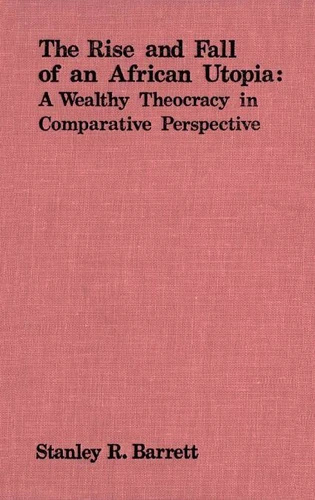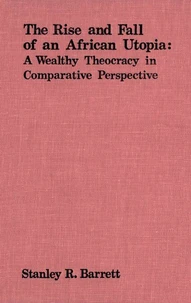The Rise and Fall of an African Utopia. A Wealthy Theocracy in Comparative Perspective
Par :Formats :
Disponible dans votre compte client Decitre ou Furet du Nord dès validation de votre commande. Le format ePub est :
- Compatible avec une lecture sur My Vivlio (smartphone, tablette, ordinateur)
- Compatible avec une lecture sur liseuses Vivlio
- Pour les liseuses autres que Vivlio, vous devez utiliser le logiciel Adobe Digital Edition. Non compatible avec la lecture sur les liseuses Kindle, Remarkable et Sony
 , qui est-ce ?
, qui est-ce ?Notre partenaire de plateforme de lecture numérique où vous retrouverez l'ensemble de vos ebooks gratuitement
Pour en savoir plus sur nos ebooks, consultez notre aide en ligne ici
- Nombre de pages270
- FormatePub
- ISBN978-0-88920-491-1
- EAN9780889204911
- Date de parution30/10/2010
- Protection num.Digital Watermarking
- Taille15 Mo
- Infos supplémentairesepub
- ÉditeurWilfrid Laurier University Press
Résumé
In 1947 a group of Yoruba-speaking fishermen who had been persecuted because of their religious beliefs founded their own community in order to worship in peace. Although located in an impoverished part of Nigeria, within a few years the village enjoyed remarkable economic success. This was partly because the fishermen held all goods in common, pooled the profits in the community treasury, and attempted to reduce the importance of the family and marriage.
After about a generation the utopia began to fall apart. The early religious zeal faded, private enterprise replaced communalism, and the family became strong once more. In an attempt to explain the initial success and eventual decline of the utopia, the author compares it with neighbouring villages that embraced similar religious beliefs but did not enjoy the same economic success. He sets the problem firmly in a broad comparative framework and draws the implications for theories of development, especially Weber's Protestant ethic thesis.
After about a generation the utopia began to fall apart. The early religious zeal faded, private enterprise replaced communalism, and the family became strong once more. In an attempt to explain the initial success and eventual decline of the utopia, the author compares it with neighbouring villages that embraced similar religious beliefs but did not enjoy the same economic success. He sets the problem firmly in a broad comparative framework and draws the implications for theories of development, especially Weber's Protestant ethic thesis.
In 1947 a group of Yoruba-speaking fishermen who had been persecuted because of their religious beliefs founded their own community in order to worship in peace. Although located in an impoverished part of Nigeria, within a few years the village enjoyed remarkable economic success. This was partly because the fishermen held all goods in common, pooled the profits in the community treasury, and attempted to reduce the importance of the family and marriage.
After about a generation the utopia began to fall apart. The early religious zeal faded, private enterprise replaced communalism, and the family became strong once more. In an attempt to explain the initial success and eventual decline of the utopia, the author compares it with neighbouring villages that embraced similar religious beliefs but did not enjoy the same economic success. He sets the problem firmly in a broad comparative framework and draws the implications for theories of development, especially Weber's Protestant ethic thesis.
After about a generation the utopia began to fall apart. The early religious zeal faded, private enterprise replaced communalism, and the family became strong once more. In an attempt to explain the initial success and eventual decline of the utopia, the author compares it with neighbouring villages that embraced similar religious beliefs but did not enjoy the same economic success. He sets the problem firmly in a broad comparative framework and draws the implications for theories of development, especially Weber's Protestant ethic thesis.




